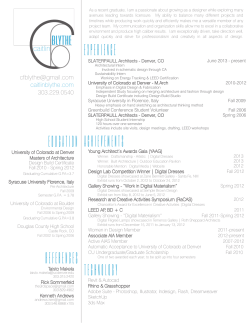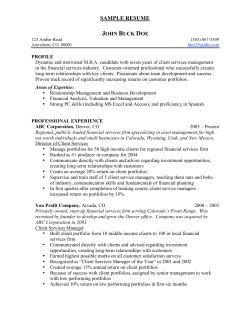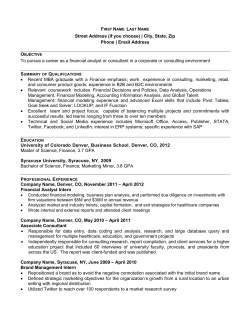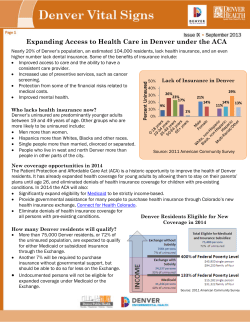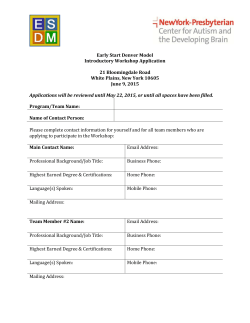
INFORMATION TECHNOLOGY-SOFTWARE: Metro Denver and
INFORMATION TECHNOLOGY-SOFTWARE: Metro Denver and Northern Colorado Industry Cluster Profile Industry Overview The information technology (IT) cluster supports business activities in all other sectors of the economy with a variety of products and services, ranging from virus protection and other security programs for computers to specialized, custom software and computer integrated systems design. Technology enterprises are highknowledge, human capital-based businesses that are expanding globally. This industry cluster report is based on a narrow definition of information technology to avoid double-counting workers in other technology clusters such as telecommunications and aerospace. This analysis divides information technology into two clusters: software and hardware. • • Hardware includes companies that manufacture computers and computer storage solutions to manage and protect business information. Software, which is covered in this report, includes companies involved in off-the-shelf software products to custom computer programming, computer facilities management, computer systems design, and data processing services. Software companies also provide network solutions, web-based applications, and operating systems. A broader information technology cluster definition includes companies involved in software, hardware, and telecommunications. The definition can be expanded to include individuals employed in information technology occupations across all industries. Using this broader definition, the Colorado Technology Association (CTA) reports there are approximately 140,000 information technology workers in the state representing more than 10,000 software, Internet, hardware, telecommunications, and related technology companies. Colorado is a global hub of innovation and entrepreneurship, attracting IT companies, a talented IT workforce, and significant capital investments. Colorado ranked third in tech-worker concentration for the sixthconsecutive year, with 8.7 percent of the state’s private sector workforce employed in technology firms, according to the TechAmerica Foundation’s Cyberstates 2013 report. The report also ranked Colorado sixth for average high-tech wage, 11th for absolute number of high-tech businesses, and 15th for absolute employment in the high-tech industry. Further, the most recent Cybercities report by the TechAmerica Foundation ranked Boulder third in tech-worker concentration, while Denver ranked 17th with nearly 9 percent of private-sector workers employed in technology firms. Denver also ranked 13th for average high-tech wage as Denver tech workers earned 81 percent more than the average private-sector worker. In 2014, technology workers in the Denver-Boulder area had the third-highest salaries in the U.S., with an average annual salary of $98,000, according to TriNet. The nine-county Metro Denver and Northern Colorado region 1 hosts a vibrant entrepreneurial community and is an epicenter for startup activity. In 2014, Denver ranked as the fifth-best place for millennial-aged entrepreneurs and ranked seventh among the “Top 10 Cities for Female Entrepreneurs,” with more than 30 percent of Denver’s businesses that are women-owned, according to NerdWallet. Forbes ranked Denver second as the best city to launch a startup business out of the 50 most populated cities and was the ninth-best city in the nation to start a small business, according to NerdWallet. Further, Colorado ranked as the fifth-most entrepreneurial state in the 2013 Kauffman Index of Entrepreneurial Activity, with 380 new business owners per 100,000 adults. Software Economic Profile The software cluster consists of seven, six-digit North American Industry Classification System (NAICS) codes including software reproduction, software publishers, custom computer programming, data processing and hosting, computer facilities management services, and computer systems design services. 1 The nine-county Metro Denver and Northern Colorado region consists of Adams, Arapahoe, Boulder, Broomfield, Denver, Douglas, Jefferson, Larimer, and Weld Counties. Metro Denver Economic Development Corporation | January 29, 2015 | Page 1 INFORMATION TECHNOLOGY-SOFTWARE: Metro Denver and Northern Colorado Industry Cluster Profile The nine-county region ranked ninth out of the 50 largest metro areas in software employment concentration in 2014. With direct employment of about 46,470 software employees, the region ranked 12th in absolute employment. About 81 percent of Colorado’s software cluster employees work in the region. Software Employment and Company Profile, 2014 Nine-County Region United States 46,470 2,900,460 Number of direct companies, 2014 4,530 196,360 One-year direct employment growth, 2013-2014 3.2% 4.1% Five-year direct employment growth, 2009-2014 9.1% 23.2% Avg. annual direct employment growth, 2009-2014 1.8% 4.3% Direct employment concentration 2.5% 2.0% Direct employment, 2014 Sources: Dun & Bradstreet, Inc. Marketplace database, July-Sept. 2008-2010; Market Analysis Profile, 2011-2014; Development Research Partners. Software Employment The nine-county region’s software employment (46,470 workers) rose 3.2 percent in 2014, compared with the previous year’s level, adding nearly 1,440 new jobs over the same period. About 4,530 software companies operated in the nine-county region in 2014. Approximately 83 percent of the region’s software companies employed fewer than 10 people, while 0.4 percent employed 250 or more. IT-Software Number of Employees Growth Rate 10% 5% 0% -5% -10% 2009 2010 2011 2012 Nine-County Region 2013 United States 2014 Avg Annual Growth Source: Dun & Bradstreet, Inc., Marketplace database, July-Sept. 2008-2010; Market Analysis Profile, 2011-2014. Metro Denver Economic Development Corporation | January 29, 2015 | Page 2 INFORMATION TECHNOLOGY-SOFTWARE: Metro Denver and Northern Colorado Industry Cluster Profile IT-Software Employment by County, 2014 Broomfield 6.7% Adams 3.7% Weld 0.7% Denver 21.0% Larimer 6.9% Douglas 7.8% Boulder 20.2% Jefferson 13.1% Arapahoe 19.9% Sources: Market Analysis Profile, 2014; Development Research Partners. IT-Software Employment by Industry Sector, 2014 Computer facilities management 0.8% Custom computer programming services 42.6% Software publishing 11.5% Data processing & preparation 13.4% Other computerrelated services 16.3% Computer integrated systems design 15.3% Sources: Market Analysis Profile, 2014; Development Research Partners. Major Software Companies • CGI Group Inc. www.cgi.com • Pearson eCollege www.ecollege.com • CIBER, Inc. www.ciber.com • Ping Identity www.pingidentity.com • Cisco Systems, Inc. www.cisco.com • Qualfon (formerly Center Partners) www.qualfon.com • Constant Contact, Inc. www.constantcontact.com • Quark Software Inc. www.quark.com • Dātu Health www.datuhealth.com • Rally Software Development Corp. www.rallydev.com • Dot Hill Systems Corp. www.dothill.com • Rivet Software www.rivetsoftware.com • EMC Corporation www.emc.com • SendGrid www.sendgrid.com Metro Denver Economic Development Corporation | January 29, 2015 | Page 3 INFORMATION TECHNOLOGY-SOFTWARE: Metro Denver and Northern Colorado Industry Cluster Profile Major Software Companies Cont’d • Hosting.com www.hosting.com • SofTec Solutions www.softecinc.com • IBM Corp. www.ibm.com • SolidFire Inc. www.solidfire.com • IHS Inc. www.ihs.com • Statêra, Inc. www.statera.com • Intermap Technologies, Inc. www.intermap.com • Swiftpage www.swiftpage.com • Intrado Inc. www.intrado.com • Sybase, Inc. www.sybase.com • JobApp Plus www.jobappplus.com • Tendril www.tendrilinc.com • Latisys www.latisys.com • Transfirst www.transfirst.com • LogRhythm Inc. www.logrhythm.com • TriZetto Corporation www.trizetto.com • MapQuest, Inc. www.mapquest.com • Trulia Inc. www.trulia.com • McKesson Technology Solutions www.mckesson.com • VMware, Inc. www.vmware.com • Oracle Corporation www.oracle.com • Webroot Inc. www.webroot.com 2014 Industry Highlights Key Company Announcements The nine-county region’s IT-software companies expanded their presence in 2014. • • • • • New York-based Signpost, a maker of marketing software, plans to hire 70 new sales representatives, account managers, and developers. The company opened its Denver office in 2013 and employs about 30 people. Pellucid Analytics Inc., a software developer, relocated to a 7,000-square-foot building in east Boulder from downtown Boulder to expand the company. The company expects to increase from 18 employees to 40 to 50 employees over the next year. Skookum Digital Works, a technology consulting firm headquartered in Charlotte, N.C., opened its first satellite office in Denver. The company plans to add 25 employees to the lower downtown office. JobAdder, an Australian-based online platform for recruitment professionals, relocated its U.S. operations from San Francisco to downtown Denver and plans to hire an additional 15 employees in the next year. OneNeck IT Solutions, an Arizona-based IT firm, broke ground on a $20 million, 35,000-square-foot data center in unincorporated Douglas County. The Tier 3+ data center will include state-of-the-art features such as three-factor security authentication, including iris scanners for personnel identification, multiple levels of redundancy and backup, and an energy-saving cooling design. The facility is slated to open in early 2015. Venture Capital and Investment Activity Entrepreneurs and startup companies in the IT-software industry have attracted significant capital and investments in the nine-county region. According to Pricewaterhouse Coopers’ MoneyTree Report, Colorado companies in the IT-software industry have attracted $1.9 billion in venture capital in more than 400 deals, representing almost 32 percent of the total amount invested across all industries in the state and about 41 percent of all deals over the last 10 years. Further, venture capital has grown over the last five years. Metro Denver Economic Development Corporation | January 29, 2015 | Page 4 INFORMATION TECHNOLOGY-SOFTWARE: Metro Denver and Northern Colorado Industry Cluster Profile Between 2009 and 2013, investments in the IT-software industry rose 35 percent, compared with no change across all industries in the state. Venture capital deals and investment opportunities increased for the nine-county region’s IT-software companies in 2014. • • • • • • Boulder-based SolidFire closed an $82 million Series D funding round, bringing its total funding to $150 million to support its cloud storage technology and expand its sales and marketing teams. The company produces flash memory storage devices to accelerate the retrieval of data from shared servers in data centers around the world. Boulder-based LogRhythm Inc. raised $40 million in venture capital funding that will allow it to add technical staff, develop new products, and expand sales and marketing operations. SendGrid, a Boulder-based company, raised $20 million in new venture capital funding to grow its business. The expansion will include additional employees and improved email management for a more powerful online business tool. Denver-based Peak raised $16 million in funding to grow its business operations. The data center and cloud computing company plans to grow its channel-centric cloud platform, expand into additional markets, and serve a larger client base. Denver-based Wayin secured $13.1 million in funding to expand its research to TV networks, brands, agencies, and publishers around the globe and increase engineering to support their technology roadmap. The company’s social technology platform helps global brands launch, run, monitor, and measure social media marketing efforts. Two Metro Denver startups raised a combined $10 million in venture capital investment to fuel growth. Boulder-based Simple Energy closed on a $6 million investment round to grow its application development for utility companies, while Denver-based GutCheck Inc. secured $4 million to grow its online market research services. Industry Infrastructure Support The nine-county region’s organizations and professional associations foster growth and opportunity for the IT-software industry. • • • • • • Denver hosted the third-annual Denver Startup Week in September 2014. The event showcased the region’s entrepreneurs, employees, and startup companies fueling innovation in the region with a specific focus on downtown Denver. Hosted by the Downtown Denver Partnership and the CTA, Denver Startup Week is a platform to convene all those who are building startups, those who want to build startups, and those who want to be involved in the community. The 2014 event attracted 7,800 attendees and 700 companies to more than 180 events to celebrate great companies, innovation, and ideas in the region. Boulder startup accelerator TechStars is a three-month program that provides up to $18,000 in seed funding for startups and an optional $100,000 convertible debt note, intensive mentorship and idea development, and the chance to present to angel investors and venture capitalists for those companies selected to participate. TechStars is supported by more than 75 different venture capital firms and angel investors. After graduating from TechStars, companies average more than $1.6 million in outside venture capital. Galvanize, a technology coworking and office space for digital startups, is helping to attract new businesses and foster entrepreneurship. The concept combines venture capital, flexible workspace, and an experimental engineering and business school called gSchool. Galvanize is expanding throughout Colorado and in San Francisco, having raised $18 million in venture capital to broaden its education offerings including teaching entrepreneurship and technology skills. Google Inc. awarded Galvanize $1 million and other assistance to increase female involvement in the technology community. The funding is expected to raise the number of female entrepreneurs by 25 percent. Galvanize is one of seven companies that received funding from Google Inc. The first phase of Industry Denver opened in May 2014. The 50,000 square feet of creative and coworking office space has been fully leased to IT-software companies Uber Technologies Inc., Roximity, Zenman, and Spotzer Media Group. Two more phases of the 120,000-square-foot, two-building complex will be completed by 2015. Launch Longmont opened in late 2014 and is a new coworking space for entrepreneurs, startups, and freelancers. The organization will eventually become an incubator and accelerator and its first phase could accommodate up to 40 people. Metro Denver Economic Development Corporation | January 29, 2015 | Page 5 INFORMATION TECHNOLOGY-SOFTWARE: Metro Denver and Northern Colorado Industry Cluster Profile • • • SCORE Denver provides mentoring and training to entrepreneurs and small business owners either starting a new business or expanding an existing one. In 2013, SCORE created 67,319 jobs in 38,630 new startup businesses, and mentored and trained 124,617 small business owners and entrepreneurs. The Blackstone Entrepreneurs Network at the Denver Art Museum launched in early 2014. The new organization, funded by a three-year, $4 million grant from Blackstone Charitable Foundation, is designed to help entrepreneurs find resources and thrive in Colorado. The network has a variety of business advisors in fields for entrepreneurship, technology, biotechnology, and health technology industries. SendGrid partnered with TechStars, 500 Startups, and Global Accelerator to provide new startup companies with access to its program. The SendGrid program will provide subscriptions to their email-handling technology to all companies entering the accelerator programs. SendGrid manages other companies’ automated email responses such as confirmation emails sent after an app is downloaded. Academic and Education Announcements The region’s K-12 and higher education systems help prepare students with the vital IT-software and computer information skills and provide a synergistic climate for the region’s thriving IT-software cluster. • • • • • Regis University opened its College of Computer & Information Sciences, Colorado’s first college fully dedicated to computer and information sciences. The College of Computer & Information Sciences will provide classes for technical skills and the impact of technology. The Colorado State University partnered with Indiana University, the University of Michigan, the University of Florida, and the University of Wisconsin-Madison to improve the way digital educational content is shared across universities and delivered to students. The technology consortium launched a new online platform, Unizin, as a one-stop shop for digital education that allow faculty to design effective learning experiences and improve how course content is created and delivered to students. The CTA launched the Colorado Technology Foundation to educate students in technical education and technology careers. The Colorado Technology Foundation partnered with the Rose Community Foundation to connect Colorado technology companies with educators and programs to improve science, technology, engineering, and math (STEM) education. Catalyze CU, a program designed by the University of Colorado Boulder, will help students launch a startup. The program is intended to function as a startup incubator and will mentor six teams of 22 student entrepreneurs. The entrepreneurs will be offered grants, space at the Spark Boulder coworking and innovation center, and mentorship from startup veterans. Denver Public Schools (DPS) received $7 million in federal Youth CareerConnect grant funds and $2.3 million in philanthropic funding to expand access to STEM education programming. The funding will further strengthen the STEM partnership between DPS and Colorado School of Mines. During the next two years, DPS will create new STEM programming at eight high schools that will focus on energy, engineering, health and medicine, digital careers, finance, information technology, and manufacturing. Cross-Cluster Convergence The nine-county region is characterized by its network of collaboration, innovation centers, and unique assets that lead to cross-cluster convergence. The IT-software industry combines these regional assets to strengthen partnerships and enhance growth opportunities across industries such as digital health and healthcare and wellness. • • • Metro Denver is an emerging digital health corridor. Founded in July 2012, the Denver South Economic Development Partnership’s PrIME Health Collaborative is a growing statewide community of 650+ health care administrators, physicians, technologists, academics, entrepreneurs, and investors dedicated to supporting innovation and technology in patient care with the goal of improving health and lowering healthcare costs. The Collaborative is a central clearinghouse for Digital Health—the convergence of the digital and genetics revolutions with bioscience, healthcare and wellness, and information technology-software—resources and overall cluster resources. In 2014, the Collaborative held a number of important events showcasing the Digital Health Corridor. Boulder-based Kindara launched Wink, a wireless fertility thermometer to help women easily record their basal body temperature readings. Wink synchronizes with Bluetooth technology to the Kindara fertility app on a user’s mobile devices and provides an integrated fertility charting experience. Two Metro Denver technology companies—Highlands Ranch-based Zen Planner and Denver-based PaySimple—partnered to help fitness and dance studios manage their business using cloud-based Metro Denver Economic Development Corporation | January 29, 2015 | Page 6 INFORMATION TECHNOLOGY-SOFTWARE: Metro Denver and Northern Colorado Industry Cluster Profile • infrastructure. Zen Planner focuses on scheduling, booking, and business management software, which connects to PaySimple’s payment-processing and payments software. Analytical Decision Services LLC, an Aurora-based startup, designed a program to simulate how healthcare facilities can improve efficiencies and manage an influx of patients. The company created a four-dimensional portrayal of a healthcare system and can add and subtract different factors that will analyze the way the organization handles patients and care. Merger and Acquisition Activity Companies in the nine-county region announced several mergers and acquisitions in 2014. • • • • • • Douglas County-based TriZetto Corp. sold to New Jersey-based Cognizant Technology Solutions Corp. The $2.7 billion deal will expand both companies’ offerings and will integrate information technology services such as consulting and IT infrastructure, and existing delivery models. TriZetto’s 980 area employees will combine with the 450 Cognizant workers in Colorado. Denver-based Rivet Software Inc. was purchased by Calif.-based Equity Administration Solutions Inc. Rivet helps public companies comply with financial reporting requirements. More than 300 public companies use Rivet’s software and Equity Administration Solutions has more than 900 customers. Nest Labs, a Google-owned company, acquired Revolv, a Boulder-producer of a hub for smart-home products. The hub serves as the central brain for app-powered smart-home devices such as locks, lights, and sprinklers. Revolv will be part of the “Works With Nest” program that helps other smart home products work with Nest. Greenwood Village-based Highstreet IT Solution purchased New York City, N.Y.-based Computer Network Solutions LLC (CNS). CNS is a company that provides telecommunications and engineering services and offers technology to manage data center and IT infrastructure services. The purchase will make Highstreet IT 50 percent larger by revenue. Swiftpage, a software company located in Denver, will sell one of its two lines of business to New York City, N.Y.-based Infor. Financial. The sale of the customer relationship management software will allow Swiftpage to focus on small business sales conversion technology. When the sale is complete, Swiftpage will have about 70 employees in its downtown Denver headquarters. Oracle Corp. purchased Lafayette-based Front Porch Digital Inc. Front Porch Digital helps its clients store and manage digital content, managing near 750 petabytes of digital content. Oracle plans to retain Front Porch Digital’s current employees and executives. Software Workforce Profile Many companies choose locations because of the available workforce. With nearly half of the nine-county region’s 3.6 million residents under the age of 35, employers can draw from a large, young, highly educated, and productive workforce. Of the region’s adult population, 41.2 percent are college graduates and 90.5 percent have graduated from high school. The state has the nation’s second-most highly educated workforce as measured by the percentage of residents with a bachelor’s degree or higher. Educational Attainment of Metro Denver and Northern Colorado's Population Age 25 and Older Less than 9th Grade 3.9% Graduate or Professional Degree 15.3% 9th to 12th Grade, No Diploma 5.6% High School Graduate (includes equivalency) 20.0% Bachelor’s Degree 25.9% Associate Degree 7.7% Some College, No Degree 21.7% Source: U.S. Census Bureau, 2013 American Community Survey. Metro Denver Economic Development Corporation | January 29, 2015 | Page 7 INFORMATION TECHNOLOGY-SOFTWARE: Metro Denver and Northern Colorado Industry Cluster Profile The attractiveness of the region draws new residents through migration. The region’s population is expected to grow 53.3 percent from 2010 to 2040, driving a 36.3 percent increase in the region’s labor force over the same period. It is important to note the changing composition of the workforce supply as the baby boomers begin to retire, which will pose implications for businesses whose employee pool includes significant numbers of these workers. The nine-county region’s software industry cluster employs 46,470 people and includes a large pool of talented, well-educated, and highly skilled workers. The age distribution of workers in the software cluster is concentrated in the younger age brackets, especially the 35-44 age group. Compared with the age distribution across all industries, the software cluster has a larger share of employees that are between the ages of 25 and 54 years old. The software workforce supply consists of four main components: those currently working in the industry; those doing a similar type of job in some other industry; the unemployed; and those currently in the education pipeline. The Metro Denver and Northern Colorado Occupation & Salary Profile below includes the 10 largest software occupations in the region. For these 10 largest occupations, the chart details the total number of workers employed in that occupation across all industries, the number of available applicants that would like to be working in that occupation, the number of recent graduates that are qualified for that occupation, and the median and sample percentile annual salaries. 3,000,000 Metro Denver and Northern Colorado's Labor Force Projections by Age 2,500,000 2,000,000 1,500,000 1,000,000 500,000 0 2010 2020 16-24 25-34 2040 2030 35-44 45-54 55-64 65+ Source: Colorado Division of Local Government, State Demography Office. Metro Denver and Northern Colorado's Distribution of Employment by Age 35% 30% 25% 20% 15% 10% 5% 0% 16-24 25-34 35-44 Software 45-54 55-64 65+ All Industries Source: Provided by Arapahoe/Douglas Works! QCEW Employees, Non-QCEW Employees, Self Employed, & Extended Proprietors - EMSI 2014.3 Class of Worker. Wages Total payroll for the software industry cluster in the nine-county region reached nearly $4.5 billion in 2013. The 2013 average annual salary for software cluster employees in the region was $99,770, compared with $102,740 nationwide. Metro Denver Economic Development Corporation | January 29, 2015 | Page 8 INFORMATION TECHNOLOGY-SOFTWARE: Metro Denver and Northern Colorado Industry Cluster Profile Metro Denver and Northern Colorado Software Occupation & Salary Profile, 2014 10 Largest Software Occupations in Metro Denver and Northern Colorado 1. Software developers, applications 2. Computer systems analysts 3. Software developers, systems software 4. Computer user support specialists 5. Computer programmers 6. Web developers 7. Network & computer systems administrators 8. Computer & information systems managers 9. Business operations specialists, all other 10. Sales representatives, services, all other Total Working Number of Across All Available Industries Applicants (2014) (2014) Number of Graduates (2013) Median Salary 10th Percentile Salary 25th Percentile Salary 75th 90th Percentile Percentile Salary Salary 19,382 340 585 $91,021 $56,056 $71,718 $111,696 $134,472 10,348 367 1,052 $77,771 $53,102 $63,731 $99,715 $136,115 10,055 105 630 $97,136 $64,210 $78,915 $118,685 $140,878 11,626 4,895 4,507 855 359 151 549 480 1,552 $51,126 $74,360 $50,024 $33,675 $47,507 $32,677 $41,018 $57,762 $41,059 $65,083 $79,373 $98,654 $131,102 $61,152 $71,989 8,567 523 696 $78,312 $50,835 $62,816 $95,389 $113,214 5,596 438 1,134 $127,296 $88,109 $105,102 $153,899 $250,890 32,981 789 77 $69,930 $36,067 $50,024 $92,622 $120,078 17,631 1,286 77 $50,877 $24,960 $34,674 $75,546 $110,864 Notes: The number of available applicants is a point-in-time measurement of the number of people who have registered in Colorado’s workforce development system’s statewide database, Connecting Colorado, as being able and available to work in a particular occupation. Results should be interpreted with caution since registration in Connecting Colorado is self-reported. In addition, the skills rubric may assign up to four occupation codes for each registrant. Therefore, the number of available applicants could be inflated. Source: Provided by Arapahoe/Douglas Works!; QCEW Employees, Non-QCEW Employees, Self Employed, & Extended Proprietors - EMSI 2014.3 Class of Worker. Education & Training Colorado’s higher education system provides an excellent support system for businesses in the region. There are 28 public higher education institutions in Colorado, of which seven four‐year and six two‐year public institutions offering comprehensive curricula are located in the nine‐county region. In addition, there are more than 100 private and religious accredited institutions and nearly 340 private occupational and technical schools offering courses in dozens of program areas throughout the state. Although not exhaustive, a list of the major, accredited educational institutions with the greatest number of graduates for each of the 10 largest software occupations in the nine-county region are included below. A directory of all higher education institutions with corresponding websites may be accessed via http://highered.colorado.gov. • Colorado State University www.colostate.edu • Jones International University www.jiu.edu • University of Colorado Denver www.ucdenver.edu • Colorado State University Global Campus www.colostate.edu • Metropolitan State University of Denver www.msudenver.edu • University of Denver www.du.edu • DeVry University – Colorado www.devry.edu • Regis University www.regis.edu • Front Range Community College www.frontrange.edu • University of Colorado Boulder www.colorado.edu Metro Denver Economic Development Corporation | January 29, 2015 | Page 9 INFORMATION TECHNOLOGY-SOFTWARE: Metro Denver and Northern Colorado Industry Cluster Profile Key Reasons for Information Technology Companies to Locate in the Nine-County Region The region is a top information technology location offering: 1. The ability to attract and retain high-quality IT professionals and technical talent • Of Colorado’s adult population, nearly 38 percent has completed a bachelor’s or higher-level degree, making Colorado the second-most highly educated state in the nation behind Massachusetts. (U.S. Census Bureau, 2013 American Community Survey) • Colorado had the nation’s sixth-largest employment base in the software publishing industry in 2012. Further, Colorado had the sixth-highest paid tech workers earning an average wage of $97,100, which was 98 percent more than the average private-sector worker. (TechAmerica Foundation, Cyberstates 2013: The Definitive State-by-State Analysis of the U.S. High-Tech Industry, 2013) • Colorado ranked fourth in the number of scientists and engineers as a share of all occupations in 2012. (National Science Foundation, 2014) • Colorado ranked among the top five most innovative states in the nation in the 2014 State Innovation Index. (U.S. Department of Commerce, 2014) • Metro Denver ranked as the ninth‐best metro area for science, technology, engineering, and mathematics (STEM) graduates in 2014. STEM jobs in Metro Denver represented 8.2 percent of all occupations and the area’s annual mean wage for STEM jobs was $84,380. (NerdWallet, 2014) • Denver ranked ninth on CIO.com’s “11 Best Cities to Find an IT Job 2013.” (CIO.com, 2014) • Fort Collins ranked among the top 10 “Most Promising Technology Hubs to Watch in 2014” and received accolades for its highly educated population, top research facilities, and green technology environment. (Techie.com, 2014) • Colorado ranked sixth in the nation in the 2014 State New Economy Index and earned several top-10 rankings in five broad categories including second in workforce education; third in high-tech jobs; and sixth in information technology jobs, among others. (The Information Technology and Innovation Foundation, 2014) • The University of Colorado Boulder, the University of Denver, and Colorado State University are among the “Top 50 Schools for Startups” in the U.S. (Forbes, 2014) • Denver ranked seventh among the “Top 10 Cities for Female Entrepreneurs 2014.” More than 30 percent of Denver’s businesses are women-owned. (NerdWallet, 2014) • Denver ranked as the ninth-best city for college graduates and received accolades for its highly educated population, moderate cost of living, and higher-than-average wages. (NerdWallet, 2014) 2. Direct access to a large and growing customer base • Colorado ranked fifth in the nation for funds raised per worker from the Small Business Innovation Research (SBIR) grant program. The state received $25.82 SBIR grants per worker compared with the U.S. average of $11.15. (U.S. Small Business Administration, 2014; U.S. Bureau of Labor Statistics, 2014) • Colorado ranked as the fifth-most entrepreneurial state in the 2013 Kauffman Index of Entrepreneurial Activity, with 380 new business owners per 100,000 adults. (Ewing Marion Kauffman Foundation, 2014) • Colorado ranked ninth for 2013 venture capital investments per $1,000 of gross domestic product. (PricewaterhouseCoopers, MoneyTree Report, 2014; Bureau of Economic Analysis, 2014) • Colorado’s leading exports are computers and electronic products, which accounted for nearly one-quarter of all Colorado exports in 2013, compared with 13 percent of U.S. exports. (U.S. Department of Commerce, International Trade Administration, 2014) 3. Low to moderate costs of doing business and a competitive tax structure • Colorado's simplified corporate income tax structure based on single-factor apportionment allows companies to pay taxes based solely on their sales in the state. Along with few regulatory burdens, Colorado's corporate income tax rate of 4.63 percent is one of the lowest and most competitive tax structures in the nation. (State of Colorado; The Tax Foundation) • Installed or downloaded standardized software products are exempted from state sales and use tax. The City and County of Denver also exempts custom software products from sales tax. (Colorado Department of Revenue) Metro Denver Economic Development Corporation | January 29, 2015 | Page 10 INFORMATION TECHNOLOGY-SOFTWARE: Metro Denver and Northern Colorado Industry Cluster Profile • • • Denver ranked as the third-best city in the nation for small business in 2014. Denver had the second highest average business credit score (649) and 10th average annual revenue ($482,483). (Biz2Credit, 2014) Colorado has the nation’s ninth-best tax climate for entrepreneurship and small business. (Small Business & Entrepreneurship Council, 2014) Metro Denver ranked fourth among Forbes 2014 “Best Places for Business and Careers” list. Four other Colorado metropolitan areas were included on the list. The Fort Collins metro area ranked fifth overall, Greeley ranked 20th, Boulder ranked 23rd, and Colorado Springs ranked 29th. (Forbes, 2014) 4. An overall better quality of life • Castle Rock ranked fourth in MONEY Magazine’s 2014 list of the “Best Places to Live.” Centennial (13th) and Boulder (23rd) were also named to the list’s top 50. (MONEY Magazine, 2014) • Metro Denver ranked as the fourth-fittest metro area in the nation in 2014. Denver’s high percentage of residents participating in physical activity, and low obesity and cardiovascular disease rates contributed to its high rank. (American College of Sports Medicine, 2014) • Colorado has the fourth-highest percentage of state land area devoted to the National Forest System. The state offers access to more than 50 national parks and wilderness areas, 42 state parks, and the greatest number of 14,000-foot peaks in the nation that support a healthy, active lifestyle. (U.S. Forest Service, 2014; Colorado State Parks, 2014) • Boulder ranked second on the 2014 list of the “Top 100 Best Places to Live.” Aurora (50th) and Lakewood (88th) were also named to the list. (Livability.com, 2014) • Denver ranked as the seventh-best city for millennials (ages 25-34) out of 25 major cities with a population over 1 million in 2014. (Niche.com, 2014) • FasTracks, a comprehensive project to build out Metro Denver’s entire mass transit system by 2019, is the largest simultaneous transit buildout in U.S. history. The expansion will make Metro Denver one of the top five regions in the country in terms of miles of fixed rail. Information Technology-Software Industry Cluster Definition NAICS Code 334614 511210 518210 541511 541512 541513 541519 NAICS Description Software reproducing Software publishers Data processing, hosting & related services Custom computer programming services Computer systems design services Computer facilities management services Other computer related services SIC Code 7372 7372 7374 7371 7373 7376 7379 SIC Description Prepackaged software Prepackaged software Data processing Custom computer programming services Computer integrated systems design Computer facilities management Computer related services NEC Note: NEC indicates “not elsewhere classified.” Metro Denver Economic Development Corporation | January 29, 2015 | Page 11 INFORMATION TECHNOLOGY-SOFTWARE: Metro Denver and Northern Colorado Industry Cluster Profile Information Technology-Software Industry Cluster Relationships Technologies Internet High-Speed Infrastructure Client Industries Aerospace Aviation Bioscience Energy Finance Geospatial Healthcare Telecommunications Security/Defense Businesses Consumers Support Industries Computer Hardware Computer Storage Telecommunications Software Infrastructure CO Technology Partners Colorado School of Mines-Computer Engineering Department CTA-Colorado Technology Association CU-Software Engineering Research Lab DU Center for Tech. Innovation TechAmerica Foundation For additional information, contact us: 1445 Market Street Denver, CO 80202-1790 303.620.8092 email: info@metrodenver.org www.metrodenver.org Prepared by Development Research Partners, Inc., www.DevelopmentResearch.net Metro Denver Economic Development Corporation | January 29, 2015 | Page 12
© Copyright 2025
